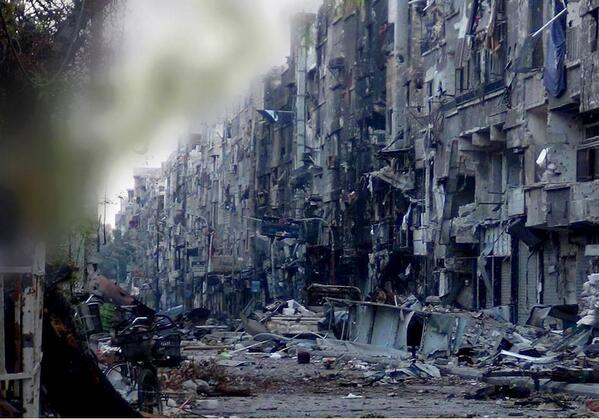Four rebel factions remain in Yarmouk in violation of an agreement to secure peace for the beleaguered Palestinian refugee camp in Damascus, a PLO official said Tuesday, according to Ma'an News Agency.
PLO executive committee member Ahmad Majdalani told Ma'an News that four factions remain in the Yarmouk camp in Damascus, despite the fact that nine factions -- including the four -- previously signed an agreement promising to withdraw.
The factions are Jebhat al-Nusra, The Islamic State of Iraq and The Levant (ISIL), Ibn Taymiyya, and a fourth unnamed faction, he said, referring primarily to a number of Wahhabi militant groups opposed to the Syrian regime.
The withdrawal of the factions is meant to allow the camp to become a neutral zone and to pressure the Syrian regime to end the 7-month-long siege of the camp, which has led to at least 30 deaths from starvation.
Al-Majdalani added that militants refuse to leave the camp because of their "political agendas," in an attempt to scuttle any possible agreement and thus to keep the camp in their hands.
Al-Majdalani announced that a delegation including himself, the head of the PLO refugees' department Zakaria Agha, and Jordanian PLO member Bilal Qassim, will head to Syria in an official visit on Tuesday.
They will meet political and security officials, Palestinian officials and Palestinian faction leaders as part of the visit.
"The delegation will try to pressure (officials) into opening safe passages for the entrance of medical and food supplies to the camp's population of around 20,000 Palestinian refugees," he said according to Ma'an New.
Al-Majdalani explained that the Palestinian Authority sent aid to the camp but it had not been allowed to enter because of the continued presence of militants in the camp.

Yarmouk Refugee Camp, photo by Agencies
He added that militants are determined to keep the camp because of its strategic position, as it is considered a gateway into Damascus.
UNRWA spokesman Chris Gunness told Ma'an Tuesday that the UN agency has "long supported strenuous international calls for a ceasefire and for the siege of Yarmouk to be lifted in accordance with international law and for the parties to the conflict to abide by international law obligations to respect civilian life. We again urge that these calls are heeded."
"In addition to the lifting of the siege, we require immediate and sustained humanitarian access so that we can bring succor to the needy and the malnourished; and thereafter we need to resume our humanitarian program fully. We are particularly concerned about the plight of some 20,000 people who remain in the camp, among them women and children. Given reports of starvation breaking out in the camp, time is running out."
After rebels seized control of Yarmouk in December 2012, the camp became embroiled in the armed fighting taking place across Syria and came under heavy regime assault.

Regime forces eventually encircled the camp and in July imposed a siege on the camp, leading to a rapid deterioration of living conditions.
In recent weeks, reports of death due to starvation have numbered in the dozens.
Fatah leader Abbas Zaki told Ma'an in mid-October that Yarmouk's population of 250,000 had dwindled to 18,000 after two and a half years of conflict in Syria.
The Syrian conflict, which began as peaceful protests in March 2011 but developed into a civil war, has killed more than 120,000 people and prompted millions to flee their homes.
Yarmouk Refugee Camp was established in 1957 on an area of 2.11 square kilometers in the city of Yarmouk in Damascus, the capital of Syria, to accommodate #Palestinian refugees. Despite the fact they have the right to return to the Occupied Territories by virtue of the UN Resolution #194 which grants them the right of return to their homes they left in 1948, but they are not allowed because of #Israel’s arbitrariness and the siege they are suffering from now under the ruling or Bashar Al Assad.
According to Abou Nasser, while some youth in the camp organized in support of the Syrian opposition, “Yarmouk remained neutral the first year of the Syrian_Revolution,” amid “public awareness and consensus that the camp should be left out” of the conflict.
But according to Abou Nasser the situation began to shift when members of the PFLP-GC fired on camp residents holding funerals for family members killed by Israeli forces as they took part in a march at the border in June 2011 commemorating the 1967 war.
About 20,000 Palestinian refugees are currently in the camp. They have faced a siege by the Syrian army since the summer without access to food, medicine or other supplies. (With Agencies)
















Comments About This Article
Please fill the fields below.